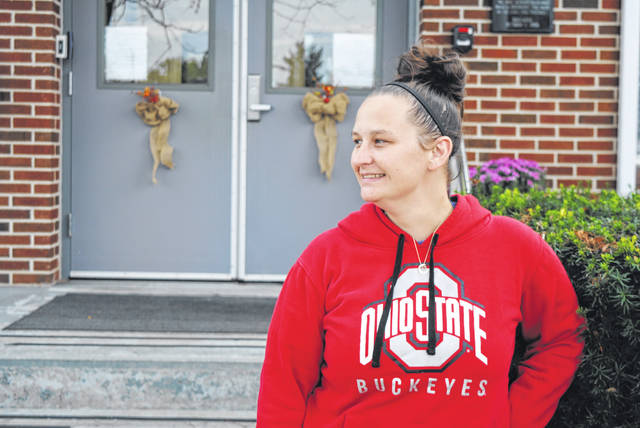
Editor’s note — This is the second in a three-part series examining Ohio Issue 1, a controversial constitutional amendment on the November ballot, from a variety of local perspectives.
Mandy Gragg has been clean for nine months, and she clings to her sobriety like it’s the last thing she has left. But it wasn’t always that way.
Gragg said she sat in the county jail for 50 days before enrolling in a residential drug treatment program in Greenfield — and it took the threat of a Fayette County prison sentence and more county time to keep her there.
“If it wouldn’t have been for those consequences of me going to jail, I would not have gotten clean,” she said.
Gragg said Issue 1, a constitutional amendment aimed at reducing statewide incarceration and using the savings to fund drug treatment programs and crime victim initiatives, would take away the consequences that kept her in treatment.
As previously reported, the amendment reduces prison sentences for prisoners by up to 25 percent with some exceptions; reclassifies fourth- and fifth-degree felony drug possession violations as misdemeanors with no prison time unless the offender commits similar offenses three times in a two-year period; and prohibits judges from sentencing those who violate probation to prison unless the violation is a new criminal offense.
Advocates of the amendment say the savings from having fewer people in prison will be diverted toward drug treatment programs to make them more available.
According to Judge Rocky Coss, who has been outspoken against Issue 1, the amendment dictates that the most severe sanction a judge can place on a person who violates probation is a six-month sentence in the county jail, but once that has been served, there can be no further jail time for future violations.
Gragg said after three months at the Lynn Goff Clinic, a women’s residential drug treatment center in Greenfield, she emerged with the tools she needed to live a sober life, but she doubts she could have made it without 375 days in local jail time hanging over her head.
Monica Baucher, who runs the Lynn Goff Clinic, said if Issue 1 passes, fewer people will successfully complete treatment programs because there will be fewer consequences in place for not completing.
“If they know that — and they’re going to know that, because they’re smart — I don’t see them finishing,” she said. “If they have that court order, they’re more likely to stay, to get into that mindset of, ‘I have a problem, I do need to complete treatment.’ If they don’t have that, their willingness to walk out the door is greater.”
Baucher said many of the people who complete the three months of programming the clinic provides are referred by the courts, although their reasons for staying tend to become more personal over time.
“They’ll say ‘I’m only here because this is better than sitting in jail.’ Then once they’re there for a month, and they’re going through groups and they’re going through counseling, they’ll get to that point where they say, ‘You know what? I’m doing this for myself,’” she said.
Baucher said none of the people who have entered treatment voluntarily at Lynn Goff have successfully completed the program.
“That’s not to say they haven’t stayed and detoxed and gotten back on their feet, but none of them have completed,” she said. “All the people who have completed the program have been court referred.”
Baucher said overall she believes the amendment will throw a wrench in an otherwise smoothly running judicial system here.
“I have nothing but good things to say about our court system in Highland County,” she said. “The judges, the probation officers, the parole officers, they’re wonderful people. They help their clients get through the system.”
Baucher said Issue 1 “will greatly hinder” that process.
Gragg said if Issue 1 had been in place when she began her recovery, she wonders if she would have made it out alive.
“I don’t get into politics,” she said. “But… I just don’t understand how anybody could see how it’s good. It’s just really scary.”
Gragg, who remains on probation, said the remaining threat of a lengthy suspended jail sentence — and knowing the pain of being separated from her family, whether in jail or on the street — is what keeps her going most days.
“I don’t know an addict alive who wouldn’t say… ‘If there weren’t any consequences, we would just get high forever,’” she said. “Somebody has to want it. If you take all those consequences away, what’s going to make them want it?”
Reach David Wright at 937-402-2570.


